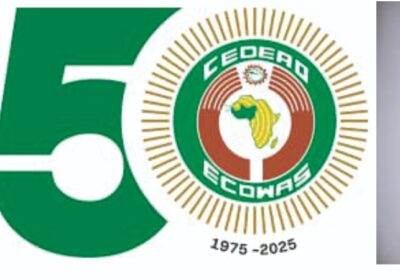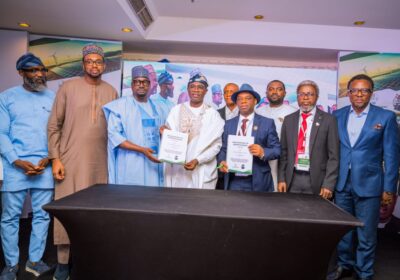ECOWAS: 50 Years of Institutional Achievements as a Continental Force for Change.
By Raymond Enoch
Over the past five decades, the Economic Community of West African States (ECOWAS) has emerged as a tall beacon of regional integration, peacekeeping, and economic collaboration in West Africa. Established on May 28, 1975, ECOWAS was formed to foster economic cooperation, promote peace and stability, and enhance the well-being of the people across West Africa.
As the community celebrates its 50th anniversary, the achievements it has made in socio-political, humanitarian, and infrastructural development stand as a testament to its vision of a united and prosperous region.
From its early days, ECOWAS aimed to create a more integrated economic bloc to provide its 15 member countries a platform to collectively address regional challenges. Today, it boasts a diverse range of accomplishments that have significantly shaped the trajectory of West African countries. ECOWAS has not only focused on economic development but has been instrumental in responding to security concerns and natural disasters, and tackling some of the region’s most pressing energy challenges.
ECOWAS’s Key Achievements:
Peace and Security in West Africa: Arguably one of ECOWAS’s most significant roles has been in the maintenance of peace and security across West Africa. Through the ECOWAS Monitoring Group (ECOMOG), the organization has intervened in civil conflicts and political crises in countries such as Liberia, Sierra Leone, and Côte d’Ivoire, Gambia and even at the moment supporting Gunea Bissau move out of political debacle. ECOWAS often deploys peacekeeping forces to stabilize post-conflict regions. These efforts have reduced the instances of regional conflicts and promoted a culture of peace-building that transcends national borders.
Economic Integration and Growth: ECOWAS’s economic integration efforts have led to the establishment of a common market, which has facilitated intra-regional trade and enhanced the movement of people and goods. Through initiatives like the ECOWAS Trade Liberalization Scheme (ETLS) and the creation of the West African Monetary Zone (WAMZ), ECOWAS has created favorable conditions for trade, investment, and regional development. This has boosted regional economic growth, creating millions of jobs and lifting people out of poverty.
Advancements in Infrastructure and Connectivity: In the last 50 years, ECOWAS has spearheaded a number of major infrastructure projects, including roads, telecommunications, and energy networks. The organization’s drive for connectivity, both within and beyond the region, has been a game changer for economic activities, particularly for landlocked countries.
Humanitarian Support in Times of Crisis:
One of the standout aspects of ECOWAS’s recent efforts has been its ability to mobilize quickly and effectively in times of humanitarian crises. In response to natural disasters like flooding, ECOWAS has not only coordinated relief efforts but also advocated for sustainable disaster management strategies.
Flood Response and Disaster Management: In recent years, devastating floods have wreaked havoc on many West African nations, displacing millions and causing substantial damage to infrastructure and livelihoods. ECOWAS has played a vital role in supporting flood-stricken countries such as Nigeria, Burkina Faso, and Ghana, providing financial aid, food, and essential supplies. Beyond immediate humanitarian relief, the organization has focused on building regional disaster response frameworks, emphasizing preparedness and resilience in the face of climate change.
Through the ECOWAS Emergency Response Fund, the regional bloc has helped affected nations recover more quickly from such disasters by deploying rapid response teams, offering technical expertise, and collaborating with international humanitarian organizations to provide comprehensive aid packages. ECOWAS also continues to push for policies that build climate resilience and enhance early warning systems across the region.
Tackling Energy Crisis:
In a region rich in natural resources but plagued by energy poverty, ECOWAS has worked relentlessly to tackle energy shortages and develop sustainable solutions. Access to reliable and affordable energy remains a major challenge for many countries in West Africa, hindering economic growth and development.
ECOWAS’s Energy Cooperation: One of the key initiatives in addressing the energy crisis has been the establishment of the ECOWAS Regional Electricity Regulatory Authority (ERERA) and the West African Power Pool (WAPP). These entities have helped harmonize energy policies, develop regional electricity networks, and encourage cross-border electricity trading. Through these efforts, ECOWAS aims to create a unified and reliable energy market that can provide energy to its member states more efficiently.
ECOWAS has also been pivotal in promoting renewable energy solutions. In response to the need for cleaner energy and reducing dependency on fossil fuels, the organization has supported several solar and wind energy projects across the region. Through the ECOWAS Renewable Energy Facility (EREF), sustainable energy projects are being implemented that reduce energy poverty, create green jobs, and contribute to environmental preservation.
Energy for All: Beyond large-scale projects, ECOWAS has been working toward ensuring access to energy for rural populations, whose lack of infrastructure limits economic development. Solar energy projects, in particular, have been successful in extending electricity to remote areas, enhancing educational opportunities, and facilitating small-scale business operations.
As ECOWAS celebrates its 50th anniversary, its journey is far from over. The challenges of today’s world—rising energy demands, climate change, political instability, and the need for greater economic integration—require a stronger, more united West Africa. The future of ECOWAS lies in its continued ability to evolve, forge new partnerships, and leverage the region’s strengths to overcome obstacles.
With a renewed focus on innovation, infrastructure development, and deepened cooperation among its member states, ECOWAS is poised to build on its remarkable achievements and guide West Africa into a new era of prosperity and resilience.
The Economic Community of West African States stands as a pillar of progress and collaboration in Africa. From conflict resolution to economic integration and tackling energy and climate crises, ECOWAS has consistently demonstrated its leadership in addressing both regional and global challenges. As the organization enters its next 50 years, the potential for continued growth and success in transforming West Africa is limitless.
ECOWAS’s ongoing support for its people, especially in times of disaster and adversity, highlights the enduring power of unity and collective action for a better, brighter future for all.








